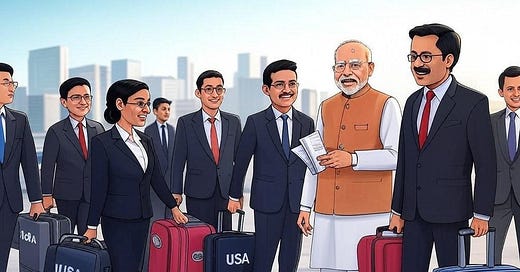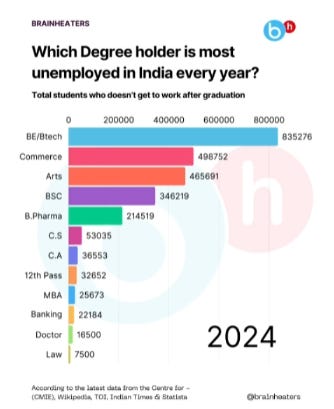Earlier this week, I tweeted a headline from an Indian news source that highlighted ways the Indian government has been leveraging organizations like the National Association of Software and Services Companies (NASSCOM) to hinder potential reforms to the H-1B visa program. The visa became a topic of heated debate during the Christmas H-1B kerfuffle on the X platform. Based on the replies, it was obvious many questioned why the Indian government was so eager to export its talent to the U.S. Allow me to posit an answer.
There are four main reasons the Indian government adopted the policy of exporting its workers:
1) There is an overabundance of graduates from Indian schools. This oversupply encourages many struggling to find adequate employment to venture abroad.
2) The remittances from overseas workers are a significant contribution to India's economy.
3) India's business processing outsourcing (BPO) industry is reliant on skilled professionals moving abroad, particularly to the U.S., where they facilitate the offshoring of white-collar jobs to India.
4) The Indian government employs migration as both a political and economic strategy that forges diplomatic and economic bonds with countries like the U.S. while enhancing India's global influence.
Let's break each of these down.
India graduates over a million engineers each year, but according to a report from an Indian business journal, almost half of these engineers are unemployed. This is partially due to many of them being incompetent as well as a domestic economy that can't produce enough jobs to satisfy demand.
The reason so many Indians pursue engineering degrees in the first place is rooted in their parents' desire to see them enter careers that offer good-paying jobs with the opportunity to travel abroad, particularly to countries that have become reliant on cheap/compliant Indian tech labor. The domestic market for engineers is oversaturated, with many of the less competent engineers left on the sidelines. IT outsourcing firms often target this group, and the Indian government, in turn, sees exporting these unemployable graduates to other countries as a convenient solution.
According to the World Bank in 2023, Indians working abroad sent home a record $120 billion in remittances, with the United States being the largest source. Many young Indians who seek employment abroad send money back home to support their families.
International students from India often work "under the table," as they are prohibited from working off-campus during their university sessions. These students typically find work with other Indian business owners in motels, gas stations, convenience stores, and restaurants. Once they secure full-time employment after graduation, a significant portion of their income is sent home to assist their families. This phenomenon is referred to as "remittance migration," where the goal is to send at least one family member overseas to send money home in order to take advantage of very favorable exchange rates. The "keeping up with the Joneses" mentality is also at play, as many Indians rely on these remittances to maintain a higher standard of living and keep up with social expectations.
The BPO sector contributes around 8% to India's GDP, nearly $200 billion, with U.S. Fortune 500 companies outsourcing everything from IT to accounting to Indian firms. This is done primarily to cut labor costs. Instead of paying fair market rates and benefits, companies outsource work to Indian firms from which they "lease" contract workers. These workers are typically in the U.S. on H-1B visas.
When you hear stories of Americans training their foreign replacements before being laid off, these outsourcing firms are often behind it. They account for nearly 50% of all H-1B sponsors. For every H-1B worker brought to the U.S., there are typically three to five workers in India whom they manage and send work to. Over time, entire projects are moved to India to save on labor costs.
This practice extends beyond outsourcing firms, as major Silicon Valley tech companies also move jobs to India. Let's be clear: India isn't inventing its own technology or creating software companies to rival other nations; it remains heavily reliant on U.S. technology companies transferring knowledge to India. This relationship is further cemented when the CEOs running the U.S. tech companies are Indian!
Lastly, the political strategy to grow its influence through the Indian diaspora has proven to be highly effective. As overseas Indians rise to prominence in their new host countries, some even attaining political power, the Indian government, particularly under Narendra Modi, sees this as an opportunity to shape global politics in ways that benefit India. Prominent figures within the diaspora, in countries like the U.S., Australia, and the U.K., often play a key role in advocating for policies that favor India, thereby strengthening diplomatic ties and expanding India's influence on the global stage. Here's how The Economist described it in an article titled "Narendra Modi's secret weapon: India's diaspora":
Mr Modi and his BJP are acutely aware of this. Their election manifesto in 2014 called the diaspora “a vast reservoir to articulate the national interests and affairs globally” that would be “harnessed for strengthening Brand India”. The next year the party’s general secretary said the BJP saw the diaspora as India’s voice abroad, “the way the Jewish community looks out for Israel’s interests in the United States”.









Well said. I've read reports that as much as 3.5% of India's GDP comes from remittances from the US alone. So it would make sense to grow their economy they would maximize this amount
One underappreciated result of Trump's first term: China begins to be seen as a rival in the eyes of the American public
One underappreciated result of Trump's second term: India begins to be seen as a rival in the eyes of the American public
Great points but I would like to add that there is an added incentive to hire non-Americans, and Indians in particular. Look no further than International Tax Treaties and Tax Exemptions. The claim is to help not to "double tax" foreign workers, but it is really just a loophole for them and employers to NOT PAY TAXES. Not only are certain foreign nationals not paying taxes, but they can also apply for lower mortgages rates. And thanks to updating Tax Treaty Laws, NRIS (Non-resident Indians) can transfer up to ONE MILLION dollars without paying any tax on money transfers. Why would a company hire H1B's over Americans? Not only does it check the box for diversity and inclusion score cards on the ESG report, but it also funnels money out of the states and leaves American's unemployed, increase in loss of homes and rise in debt. Perfect investment opportunity awaits. This is planned destruction in the name of DEI thanks primely to Blackrock and Vanguard who have implemented and overseen this demographic shift.